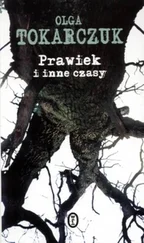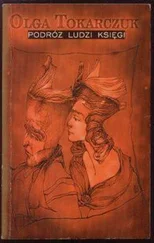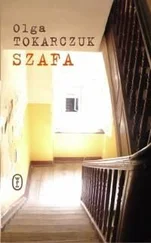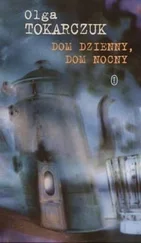“He’s got a screw loose,” muttered the man with the cigarette. “Where do you send letters to? To Radio Free Europe, perhaps?”
“Only to car firms or travel agencies…”
“What was your connection with Ukleja’s wife?”
It took Izydor a while to realise they meant Ruta.
“You could say everything and nothing.”
“Leave out the philosophy.”
“We were born on the same day and I wanted to marry her… but she left.”
“Do you know where she is now?”
“No. Do you?” asked Izydor hopefully.
“None of your business. I’m asking the questions.”
“Gentlemen, I’m innocent. The Polish Post Office is pleased with me. They’ve just told me that.”
The men got up and headed for the exit. One of them turned around again and said:
“Just remember you’re under observation.”
A few days later Izydor received a crumpled, soiled letter with foreign stamps of a kind he had never seen before. On impulse he glanced at the sender’s name and read: “Amanita Muscaria.”
These words seemed strangely familiar. “Maybe it’s a German company,” he thought.
But the letter was from Ruta. He guessed as soon as he saw the clumsy, childish handwriting. “Dear Izek,” she wrote, “I am far, far away, in Brazil. Sometimes I can’t sleep because I miss you all so much. And sometimes I don’t think about you at all. I have a lot to do here. I live in an enormous city full of colourful people. How is your health? I hope my mama is well too. I miss her very much, but I know she couldn’t live here. I have everything I wanted. Don’t send anyone my love, not even my mother. Better they forget about me quickly. Amanita Muscaria.”
Izydor had a sleepless night. He lay staring at the ceiling as images and odours came back to him from the days when Ruta was still here. He remembered her every word, every gesture. One by one he brought them back to mind. When the sun’s rays reached the eastern window in the roof, tears rolled from Izydor’s eyes. Then he sat up and looked for an address: on the envelope, on the piece of paper, even under the stamp and in its intricate drawing. But he couldn’t find one.
“I’ll go to her. I’ll save up the money and go to Brazil,” he said out loud to himself.
Then he thought of an idea that the secret police agents had unwittingly suggested to him. On a piece of paper torn from an exercise book he wrote: “Please send me some brochures. Best wishes, Izydor Niebieski.” On the envelope he wrote the address: “Radio Free Europe, Munich, Germany.”
The clerk at the post office went pale when she saw this address. Without a word she handed him a form for a registered letter.
“And a complaint form, too, please,” said Izydor.
It was a very simple deal. Izydor sent a letter like that once a month. He knew it would not just never reach the addressee, but wouldn’t even leave the boundaries of the county. Every month he received compensation for the letters. Finally he put a blank sheet of paper in the envelope. There was no point asking for brochures any more. This was extra income, which Izydor put aside in an old unrra tea tin – for a ticket to Brazil.
The next spring the secret police agents in raincoats took Izydor off to Taszów. They shone a lamp in his eyes.
“The code,” said one of them.
“What’s a ‘code’?” asked Izydor.
The other one slapped him in the face.
“Give us the code. How do you code the information?”
“What information?” asked Izydor.
He was hit in the face again, harder this time. He could taste blood on his lips.
“We’ve checked every word, every square centimetre of the letter and envelope by all available methods. We’ve peeled the paper apart. We’ve checked the stamps. We’ve enlarged each one several dozen times. We’ve examined their serration and the composition of the glue under a microscope. We have analysed every letter, every comma and full stop…”
“We haven’t found anything,” said the other one, the one who had hit him.
“There’s no code there,” said Izydor quietly, wiping his bleeding nose with a handkerchief.
Both men burst out laughing.
“All right then,” the first one began. “Let’s agree to start again from the beginning. We won’t do anything to you. We’ll write in our report that you’re not entirely normal. Everyone thinks of you like that anyway. And we’ll let you go home. And in exchange you’ll tell us how it all works. Where did we go wrong?”
“There’s nothing there.”
The other man was more nervous. He brought his face close to Izydor’s. He stank of cigarettes.
“Listen, wise guy. You’ve sent twenty-six letters to Radio Free Europe. There were blank pieces of paper in most of them. You’ve been playing with fire. And now you’ve gone too far.”
“Just tell us how you coded them. And that’ll be it. Then you’ll go home.”
Izydor sighed.
“I can see it’s very important to you, but I really don’t know how to help you. There weren’t any codes there. They were just blank sheets of paper, nothing more.”
Then the second secret policeman jumped up from his chair and punched Izydor in the face. Izydor slid off his chair and lost consciousness.
“He’s a loony,” said the first one.
“Remember, pal, we’re never going to let you alone,” drawled the second, rubbing his fist.
Izydor was kept under arrest for forty-eight hours. Then a guard came for him, and without a word opened the door to let him out.
All week Izydor didn’t come down from his attic. He counted the money in the tin and found he had a real fortune there. In any case, he didn’t know how much a ticket to Brazil might cost.
“That’s enough of the letters,” he told Misia when he came down into the kitchen. She smiled at him and breathed a sigh of relief.
The time of animals is always the present.
Dolly is a shaggy, red-haired dog. She has brown eyes that sometimes shine black. Dolly loves Misia best of all, so she always tries to have Misia within range of sight. Then everything is in its place. Dolly follows Misia to the well, into the garden, and goes out with her onto the Highway to take a look at the world. She never lets Misia out of her eyes’ embrace.
Dolly doesn’t think how Misia or any other person thinks. In this way there is a huge gulf between Dolly and Misia, because to think you have to swallow time, internalise the past, the present, the future and their constant changes. Time works inside the human mind. It is nowhere to be found on the outside. In Dolly’s small dog’s brain there is no channel, no organ to filter the passage of time. So Dolly lives in the present. That is why when Misia gets dressed and goes out, Dolly thinks she is leaving forever. Every Sunday she goes to church forever. She goes down to the cellar for potatoes forever. When she disappears from Dolly’s field of vision, she disappears forever. Then Dolly’s grief is boundless, she lays her muzzle on the ground and suffers.
Man harnesses his suffering to time. He suffers as a result of the past and extends his suffering into the future. In this way he creates despair. Dolly only suffers here and now.
Human thinking is inseparably linked with swallowing time. It is a sort of choking. Dolly perceives the world as static images that some God has painted. For animals, God is a painter. He spreads the world before them in the form of panoramic views. The extent of these crude pictures lies in smells, touches, flavours, and sounds, which contain no meaning. Animals do not need meaning. People sometimes feel something similar when they dream. But when they are awake, people need meaning, because they are prisoners of time. Animals dream incessantly and for nothing. For them, waking up from this dream is death.
Читать дальше












